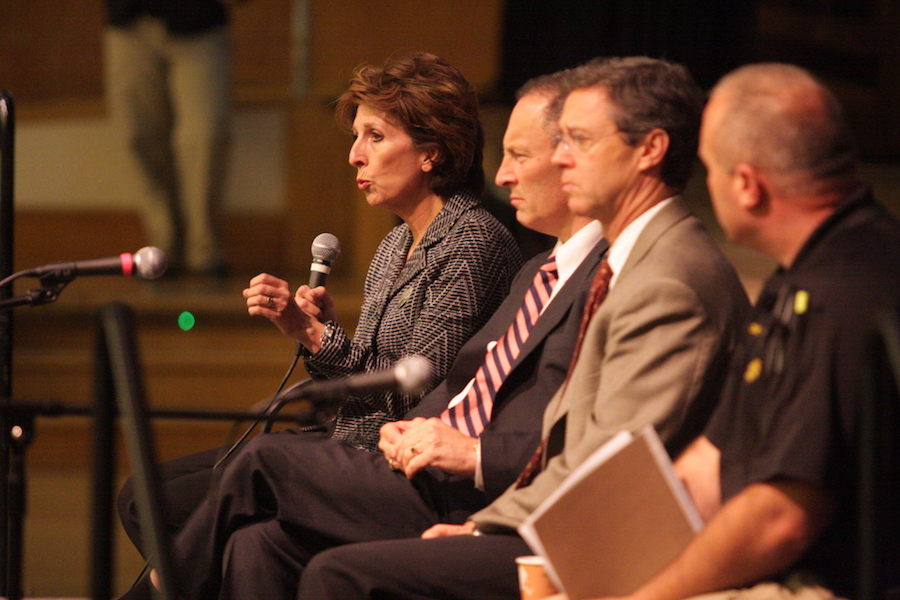
New resolution voices concerns of student representation to UC Regents
ASUCD passed a new resolution on Oct. 20 calling for a halt in the University’s chancellor search until a more democratic process is established. Resolution #1, which passed unanimously, came just two weeks after the Graduate Student Association (GSA) passed its own version of the demands.
“As the resolution notes, the search committee assembled by Janet Napolitano has many flaws, the most unfavorable being the blatant lack of student representation on the committee,” said ASUCD President Alex Lee in a letter to the UC Davis community after the resolution had passed. “Only one undergraduate student and one graduate student have been placed on a search committee of 17 members.”
The advisory search committee, which was formed in September as part of the search for a new chancellor, falls under UC Regents policy 7102. The resolution includes a condemnation of the policy and calls for a new process that can be “established at the institutional level for all UC campuses.”
Elly Oltersdorf, a fourth-year history major and the undergraduate student representative on the advisory committee for the chancellor search, authored the resolution. In working with GSA, the committee noted the frustration that both undergraduate and graduate student bodies have shared in the search process.
“I think the momentum started with graduate students, because they passed a resolution like this one first,” Oltersdorf said. “So in a way, they […] served as the inspiration to undergraduates who were feeling a lot of the same distrust in this process, but didn’t exactly have a plan yet of what to do about it.”
Lee, who sent the letter to the UC Regents, said that he discussed it with UC President Napolitano and noted her possible reasons for wanting to adhere to some of the demands.
“I think […] Napolitano definitely feels for the cause of wanting more student engagement in this, because, at the end of the day […] this is […] a very political choice because of the incidents that have happened [at UC Berkeley and UC Davis],” Lee said. “If Katehi were any other chancellor that had resigned because they had to retire or something, it’s not a big deal right? But this is a very political landscape with two chancellors who are in the hot seat, so from their perspective, I think they want to change.”
The resolution was co-authored by ASUCD Senators Adilla Jamaludin and Irveen Grewal. Jamaludin, a third-year environmental policy analysis and planning major, believes the need for a different search process is something that most students could agree on.
“It is generally understood that this entire process is shrouded in mystery,” Jamaludin said. “I think it passed because students realize that there needs to be more transparency about this. And we might not fully agree on what that new frame would look like but at least we can agree that the current state […] is not the right way to go about things.”
Grewal, a third-year political science and psychology double major, sees UC Davis students sensing secrecy surrounding the search process.
“Students are very confused on campus as well,” Grewal said. “They don’t know what’s happening. They’re just like, ‘do we just stay with this decision?’ The reason the whole protest happened was so that we can change the system. They need to listen to us for something to happen or we’re going to be in the same situation we’ve been in for the past 10 years.”
President Napolitano is scheduled to present a nominee to the Regents by January 2017. With the date approaching quickly, many have doubted the possibility of a selection by then.
ASUCD Senator Sofia Molodanof, a third-year English major, said that the vote on the resolution represents an agreement about the need to pay close attention to who is being considered for the position and to reevaluate the timeline set for choosing a new chancellor.
“I think that everyone was […] on board with this because we knew how important it is to choose our chancellor, and we want to make the right decision,” Molodanof said. “I think that a lot of people are afraid that if we don’t [take] enough time, we could be pushed into a situation that makes us choose someone that may not be the right fit. And a chancellor is someone who’s not just here for a year. They’re gonna be here for a while, so we want to make sure that they represent the student body so we don’t have to go through this whole thing again.”
Grewal noted that concerns continue to arise which many students had during the previous administration, including former chancellor Katehi’s emphasis on STEM students.
“I understand what she was trying to push for, and she did do a lot for STEM, I’m not saying she didn’t do anything at all, but it’s also the whole balancing thing,” Grewal said. “As a student [in the social sciences], we kind of feel pushed aside. I’m happy that STEM is doing great but we want to be represented too. We want to have a global representation of our majors and what we’re doing.”
Oltersdorf has kept in contact with students throughout the process through mediums such as the Facebook page that was created for students to post input into the selection. Oltersdorf said that students who seem disinterested may not have enough information regarding the chancellor-hiring process.
“People might accuse students of being apathetic because of their lack of interest in who the new chancellor is, but it’s not a lack of interest,” Oltersdorf said. “It’s a lack of voice and it’s a lack of information, which is why the first step that we can take as a student body and that ASUCD did take was to demand more information.”
Written by: Ivan Valenzuela — campus@theaggie.org




